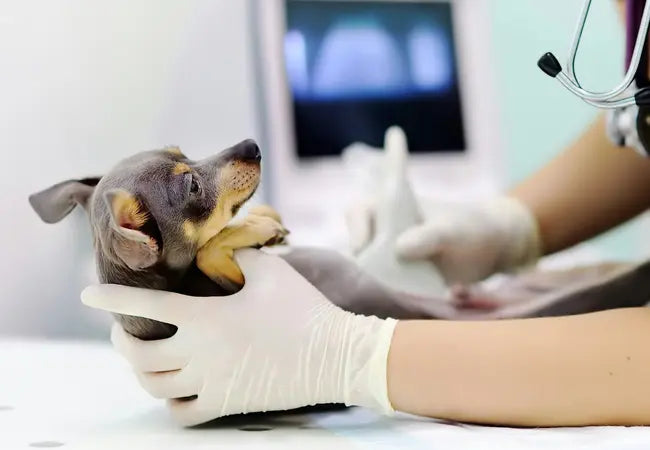Vet’s 2025 Guide to Canine Testicular Degeneration & Hypoplasia 🩺

In this article
Vet’s 2025 Guide to Canine Testicular Degeneration & Hypoplasia 🩺
By Dr. Duncan Houston BVSc
💡 What Are Testicular Hypoplasia & Degeneration?
Testicular hypoplasia is a congenital condition where one or both testes develop abnormally small due to poor germ cell formation—often hereditary or associated with cryptorchidism.
Testicular degeneration is acquired testicular shrinkage and dysfunction caused by toxins, heat, trauma, illness, infection, or aging.
🚩 Causes & Risk Factors
- 🧬 Hypoplasia: genetic, cryptorchidism, abnormal germ cell migration, intersex anomalies.
- 🧪 Degeneration: exposure to radiation, heavy metals (lead), toxins, heat, antifungals, hormone imbalances, orchitis, aging, pituitary tumors.
- 🚫 Cryptorchidism: retained testes remain small, sterile, and prone to cancer—surgical removal is advised.
👀 Clinical Signs & Effects
- 🔬 Noticeably small or asymmetric testicles on palpation.
- 🧪 Infertility—low sperm count or no sperm (oligospermia/azoospermia).
- 💔 Soft, “flabby” testes if degeneration; firm hypoplastic testes if congenital.
- 👃 May behave normally hormonally unless Leydig cells are compromised.
🧪 Diagnosis & Work-Up
- Physical exam & history: evaluate testicle size, cryptorchidism, past exposures or trauma.
- Ultrasound: confirms small size, evaluates texture, and blood flow.
- Semen analysis: measures sperm count, motility, morphology.
- Fine‑needle aspiration or biopsy: distinguishes hypoplasia from degeneration (e.g., wavy basement membrane in degeneration).
- Bloodwork & endocrine testing: rule out pituitary issues, systemic toxins, orchitis.
🛠 Treatment Options
1. Address Underlying Cause
- 📛 Remove toxins or heat sources; treat orchitis/infections with antibiotics.
- ⚙️ Manage hormonal issues or pituitary tumors if present.
- 🔧 Remove retained or cryptorchid testes surgically to prevent cancer.
2. Hormonal Therapy (Variable Success)
- 💉 FSH, hCG, GnRH treatments have shown limited results—most dogs remain infertile.
- 📈 Not effective in congenital hypoplasia—germ cells are absent.
3. Breeding & Management Choices
- ❌ Dogs with hypoplasia or degenerative changes should not be bred—genetic or pathological issues.
- 👶 If fertility is crucial, pursue aggressive diagnostics and hormone stimulation in degeneration; low expectations.
- 🏥 Castration is recommended if retained testicles or poor fertility, to prevent complications.
📈 Prognosis & Follow-Up
- 📉 Hypoplasia: poor to no chance of fertility—irreversible.
- 🔄 Degeneration: variable—some reversal if the cause removed early, but often permanent.
- 📅 Ongoing monitoring via semen analysis and testicular imaging.
- ⚠️ Risk of testicular cancer and cryptorchid complications—castration helps improve prognosis.
🏡 Ask A Vet App – Home Monitoring Tools
- 📆 Set reminders for endocrine testing, ultrasounds, and semen checks.
- 📊 Log testicular size and behavior changes between vet visits.
- 📸 Upload scrotum images to monitor swelling or asymmetry.
- 🔔 Receive alerts for follow-up testing intervals or abnormal findings.
- 📚 In‑app guides on castration care, hormone therapy protocols, breeding advice.
🔑 Key Takeaways 🧠✅
- 🧬 Hypoplasia is congenital & irreversible; degeneration is acquired—early intervention may help.
- 🔍 Diagnosis requires an exam, an ultrasound, semen testing, and sometimes biopsy.
- ⚠️ Hormonal therapy has limited success; castration is often recommended for retained or non-functional testes.
- 📆 Regular monitoring and semen evaluation guide management and breeding decisions.
- 📱 Ask A Vet app supports owners with tracking, reminders, photos, and vet collaboration.
🩺 Final Thoughts ❤️
In 2025, canine testicular hypoplasia and degeneration can be accurately identified through imaging, semen analysis, biopsy, and lab work. While fertility outcomes vary, castration is generally advised to prevent complications. With informed diagnosis, monitoring, and tools like the Ask A Vet app, owners and vets can make confident decisions—ensuring optimal health and peace of mind for their dogs. 🐾✨
Visit AskAVet.com and download the Ask A Vet app to log testicular exams, semen results, imaging reminders, photos, alerts, and stay connected with reproductive specialists anytime. 📲🐶






